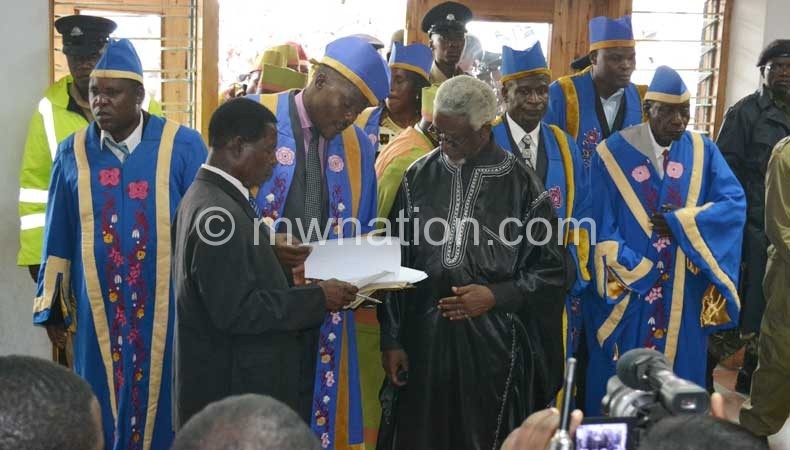When modernity and tradition clash
The hall is tensed up. Traditional leaders are dressed down. Enough is enough, say local masses of Kafukule in Mzimba.
That was a week ago during a heated interface meeting that witnessed the locals rising up without fear to accuse customary authority of frustrating development projects.

Matthews Tembo from Malumbo Ziba Village, Traditional Authority Mtwalo said the traditional leaders have scrambled for all area development committee (ADC) positions against stipulations that the leaders should be mere advisers.
“This is a problem here because when they mess up, we fail to trace them. Culturally, we cannot take our own traditional leader to task.
“As such, they need to leave positions to lay people while they assume the role of advisers. As it is now, developments are lagging behind,” he said.
Mtwalo ADC has 17 members, and all of them are village heads, confirmed the committee’s vice secretary Magezana Tchongwe.
“When there are elections, it is usually the traditional leaders who mobilise themselves to choose leaders among themselves.
“This has a consequence. There is no transparency and accountability when they misappropriate Local Development or Constituency Development funds,” said Tembo.
He said examples abound in his area where locals are afraid to take to task a village head who disappeared with CDF materials meant to support development projects such as the construction of a primary school or health facility.
In Karonga and in the Shire Valley, traditional leaders are also accused of frustrating relocation programmes of flood victims from lower areas to the highlands.
According to Nkhata Bay district commissioner (DC) Alex Mdooko, who previously served as DC for Chikwawa, village heads refuse to relocate for fear of losing their chieftaincy.
“This has affected government’s efforts in making sure that people are protected from floods in the Shire Valley,” Mdooko said.
Politically, the chieftaincy has been reduced to a mere pawn to advance the interests of the ruling political parties. This invites questions as to whether chieftaincy is still relevant in modern day Malawi.
If it is, how best can they play their role in safeguarding developments in rural areas?
Mdooko observes that the country needs to abolish chieftaincy if there is to be sanity in the implementation of various development projects.
He argues that paying the chiefs monthly honoraria is a waste of public funds at a time the country has councillors to implement local development projects.
“Just like our colleagues in Tanzania, we need to abolish chieftaincy. Most of the roles chiefs assume can be done by councillors,” he said.
At the last count, Malawi had close to 34 589 village heads with an honorarium of K2 500 each, 7 492 group village heads (receiving K5 000 each), 59 sub-traditional authorities, 164 traditional authorities (earning K18 000 each), 39 senior chiefs (getting K30 000 each) and seven paramount chiefs (earning K50 000 each). This means yearly, Malawi spends at least K1.5 billion to pay traditional leaders. In a month, the leaders pocket at least K128 million.
Senior Chief Mtwalo, however, says the main challenge is not with the chieftaincy for corruption and misappropriation of public funds in his area.
He says the main challenge is with the human tendency to take up positions with the aim of enriching oneself.
“Abolishing chieftaincy is not the solution for Malawi to develop. Even if councillors can take up our roles corruption and misappropriation of resources will not stop.
“These days, people are not seeking for positions to serve their communities. Both chiefs and politicians are fighting for positions to enrich themselves. It’s the hunger for power that we need to address,” he said.
Mtwalo said villagers in Tanzania are longing for the reinstatement of chiefs because they are a lesser evil than elected officials.
“Chiefs are even better than elected officials. These politicians make the best of the little time they are in office to fatten their pockets.
“We don’t usually do that because we are always with the people on the ground,” he said.
Governance specialist Kinnear Mlowoka said it would not be easy to abolish chieftaincy in Malawi because of its cultural relevance.
He, however, said the nation needs to be thinking about abolishing the honoraria that the chiefs receive, adding such funds can be used for other development projects.
“Malawi is like a village. To abolish chieftaincy would take us a decade. For example, if we are failing to do away with chiefs in towns what more in villages?”
“Our focus should be on rechannelling the money chiefs receive to other developments because the economic situation we are in is not conducive to spend millions on chiefs for the job they have done in years without pay.
“The decision to pay chiefs was a political move to influence their decisions in siding with government. This needs to be abolished,” he said.
Mlowoka said if not, then the chiefs need to be taxed on the money they receive.
“Some of them receive non-taxable honorarium of up to K50 000 in a month. That amount of money is a salary to some civil servants and they are taxed.
“For example, teachers work very hard, receive little and pay tax. What more with the chiefs who appear to be mere political cheerleaders?” he asked.






Please note the spelling. It is not Tchongwe. It is Chongwe. Don’t come up with your own spelling. It is how it is spelt not how it sounds.